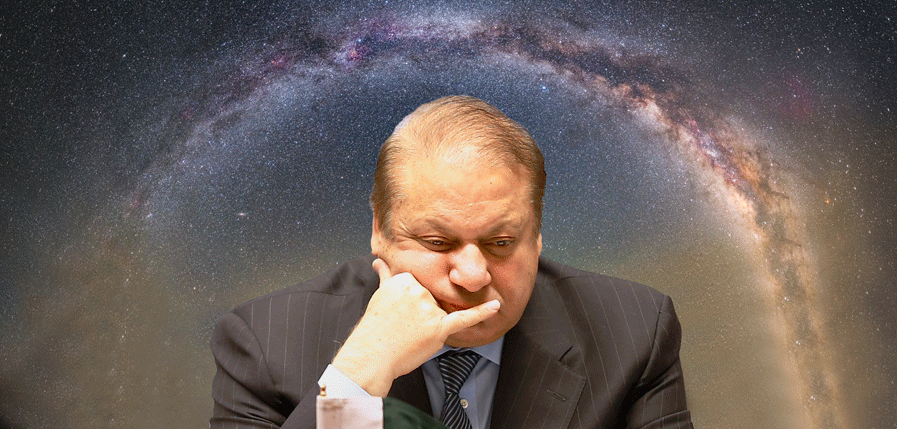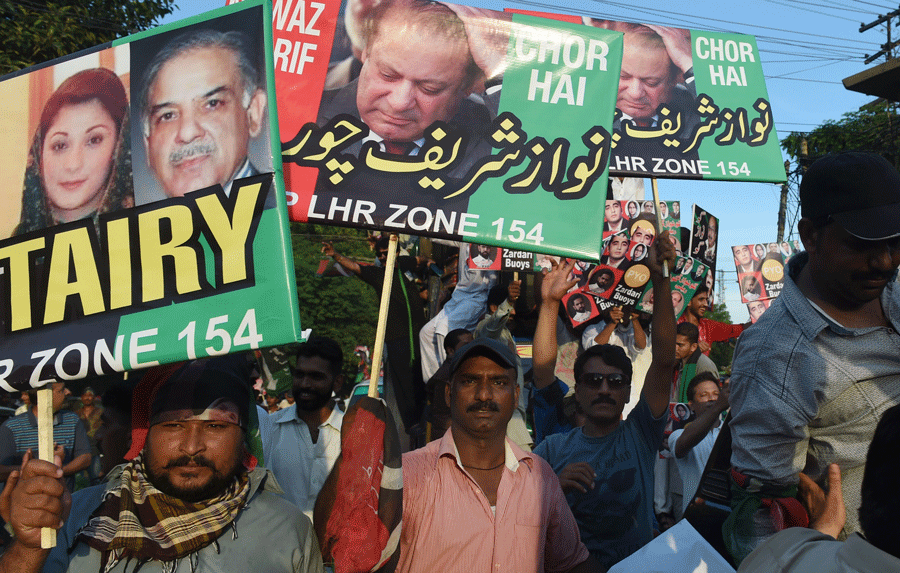Conspiracy of the Stars
By Ayaz Amir | Cover Story | Published 7 years ago
It wouldn’t be the Pakistan army if it did not take a deep and abiding interest in the goings-on on the political front. But it would be inaccurate to go on from this premise and jump to the conclusion that developments pre and post-Panama have been manipulated by some master hand operating from the shadows.
Some things just happened… no one in the intelligence community could have predicted the Panama Papers or where the fallout would lead. It was all too hazy and inchoate. But it would be a foolish person who would deny that some things were beaten into shape, the powers that be — if this is the awkward phrase we must use — taking their opportunities as they came.

And there was Pakistan’s most experienced and weather-beaten politico who failed utterly to grasp the dimensions of the crisis unfolding around him. He fumbled and gave less than convincing speeches. And he avoided the National Assembly which should have been his best bet. The Assembly would have been on his side, but he would have needed to reach out to — you may have guessed it — the super-pragmatist, Asif Ali Zardari. His pound of flesh, and he would have asked for it or he would not be the man of guile he is credited to be, should not have been too hard to deliver.
But Nawaz Sharif failed to read the weather as well as the stars. He fell back on the one tool he was always adept at: prevarication. But Panama was no ordinary archaeological site because it virtually meant digging up Nawaz Sharif’s past — all the way to the 1990s when power and wealth working hand-in-hand led to the realisation of that dream of every rising Pakistani: a property stake in London.
Dubai is for parvenus. Only London — and now of course New York — meant that you had truly arrived. This was especially true for very small-time tradesmen or artisans who, well before Partition, had made the trek from the eastern part of Punjab to seek better times in Lahore. Brandreth Road, deep in the heart of old Lahore, was where they set up their first iron foundry.
The psychology of the Sharifs — and the stance they adopted in the course of the Panama case proceedings — cannot be understood without taking in not just the geography, but the ethos of Brandreth Road. Just as Zardari, for all the later property hunting around foreign shores, cannot be understood without going all the way back to Karachi’s Bambino Cinema of the 1960s and ’70s. It is scarcely a Freudian revelation that roots matter. Jati Umra is a fantasy, coloured by nostalgia. Brandreth Road is where it all began.
The ISI did not create the Panama Papers. But this is not to say that the sharp-eyed denizens of that nether-world would not have derived a quiet pleasure from the gathering tribulations of the Sharifs. The army and the ISI are quick to shed their calm when it comes to military bungling. Then it is all bugles and shrill whistles. But when it is civilians setting fire to themselves, the stoicism of the army and the ISI has to be admired. Even as they keep a straight face, a distant look comes into their eyes. Woe to the civilian who, in such circumstances, looks to the gods of the underworld for comfort.
It also has to be understood that in the army’s officer corps there has been a profound shift of prejudice. Time was — and not so long ago either — when the anti-state, the anti-patriotic, was the Pakistan Peoples Party. Today in the mind of the typical army officer the friend of India — the ultimate indictment as far as the army is concerned — and the source of all corruption in national life, is Nawaz Sharif and his party.
This turnaround is not without its delicious ironies. Back in General Zia-ul-Haq’s days, Nawaz Sharif was the most finished product of military necessity. The master strategists of that time wanted a class of loyal handymen who could act as a countervailing force to the PPP. Nawaz Sharif fit the bill and he was groomed and helped to high office.

The Sharifs under the canny guidance of their patriarch, the elder Sharif, did a double take: even as they climbed up the political ladder they never forgot that wealth, and inordinate wealth at that, is the better half of politics. One factory followed another, until a veritable empire was created — with the tangled roots of Lahore leading all the way to the fairer parts of London, the ultimate destination of all international shysters on the make: from shadowy Russian oligarchs to every Arab sheikh worth his weight in dollars. For the Sharifs not to be part of this racket would have meant that they hadn’t truly arrived. It would also have meant that the clang of the hardware shops of Brandreth Road had not been truly erased from the mind.
In the saga of Nawaz Sharif’s decline and fall, the so-called Dawn leaks affair will occupy an important footnote. That’s when the army saw red. In a meeting at the Prime Minister’s House, having it out with the ISI chief on the question of army-backed outfits waging proxy wars was one thing. But having the full linen, with all the telltale stains on it, displayed on the front page of Dawn, was something completely different.
Had Nawaz Sharif understood the full implication of this affair he would have acted decisively to placate the army’s sense of wounded honour. But almost as if on cue, he took recourse to his favourite tool: prevarication — further deepening the feeling in the army high command that Nawaz Sharif was playing politics with it.
The ISI did not engineer the two Supreme Court verdicts in the Panama case. It did something else — ensure security for the Supreme Court judges, thus effectively insulating them from any pressure that the N League could have mounted. Nawaz Sharif’s cries of ‘conspiracy’ really amount to this: that the N League, which needed no lessons in how to reach out to the judiciary, had lost physical access to their several lordships.
The Joint Investigation Team (JIT) was set up by the Supreme Court, not the ISI. From Nawaz Sharif’s perspective, there was a fatal proviso in the JIT: the fact that one of its members was from the ISI and another from Military Intelligence. All the formidable resources of these organisations were accordingly available to the JIT.
Not one person in the media thought that the JIT would be able to complete its report in 60 days, but it did and Nawaz Sharif’s goose was cooked. His travails are not over. After his disqualification as prime minister, he is being tried in an accountability court whose decision is likely to come any day now.
The political front is in disarray and into this breach who should step in but My Lord the Chief Justice who, through his suo moto actions and pronouncements, is creating headlines virtually every day… to the no small consternation of what is left of civilian governance. The National Accountability Bureau (NAB) under its new chairman, Justice Javed Iqbal, stands infused with a new spirit. Ghosts of scandals past are coming back to life to haunt Nawaz Sharif, whose party is still nominally in power, both at the centre and in Punjab.
Buffeted from two sides — by NAB’s reawakening and the vigorous notice My Lord the Chief Justice is taking of governmental inadequacies and malfunctioning — Nawaz Sharif and his party complain of a plot to deprive them of any meaningful share in power.
How all this plays out the coming elections should tell. The big question is, will they be held on time? Whispers going around say they can be delayed for a few months. But few people seem to have a convincing answer as to why. My Lord the Chief Justice says he will countenance no delay. He also has spoken out rather forcefully against any constitutional deviation.
Back in October 1999, when General Musharraf ousted him from power, Nawaz Sharif enjoyed the backing of the Saudi royal family. This time round he is bereft of that support. The present ruling Saudis face problems of their own and they know — this lesson having been brought home by the Yemen crisis — that what they want from Pakistan, only the army can deliver. The new Saudi alliance is with the Pakistan army, not the house of Sharif.
When Nawaz Sharif, along with his younger brother Shahbaz, visited Saudi Arabia a couple of months ago, the real power in Saudi Arabia, Crown Prince Muhammad, kept Nawaz Sharif waiting for three days, and when he finally deigned to meet him, it was at three in the morning. This says it all about the fallen fortunes of the Sharifs.


